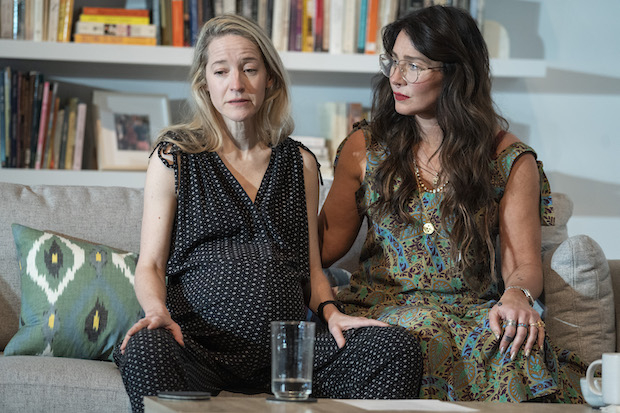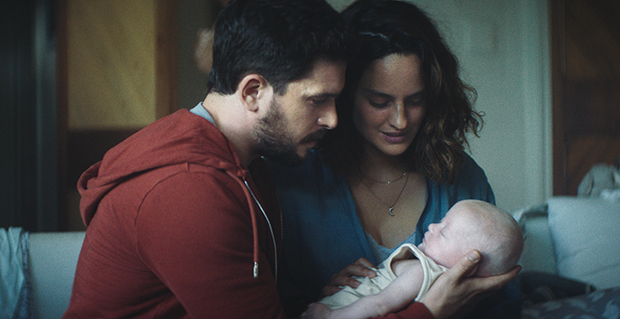Interview: Erica Schmidt and Bess Wohl on Motherhood, Theater, Lucy, and Baby Ruby
The writer/directors discuss their latest works, which explore the fears and anxieties of being a parent.
Is there anything as anxiety ridden as parenthood? You're sent home from the hospital with a creature you don't know quite how to take care of yet; you're up all night for weeks on end…And right when you're past one hurdle, a new one appears.
In their latest works, playwrights Bess Wohl and Erica Schmidt are tackling the fears head on. Wohl makes her debut as a screenwriter and director with Baby Ruby, a film that follows a couple (Kit Harrington and Noémie Merlant) as they deal with postpartum depression and psychosis. Schmidt's Lucy, which she also directs for Audible at the Minetta Lane Theatre, finds a single, working mother (Brooke Bloom) at odds when she begins to realize that her kids are becoming more attached to their nanny (Lynn Collins).
Both properties can be classified, in some way, as horror, but it's horror that comes from the everyday realizations that being a parent isn't easy, and there's no such thing as perfection. The difficulties of parenthood, of motherhood, are still discussed with hushed voices in society, and with that in mind, we gathered Schmidt and Wohl to bring them to the fore.

(© David Gordon/Tricia Baron)
This conversation has been condensed and edited for clarity.
When you set out to create these two works, what were your goals?
Bess Wohl: I felt like I hadn't seen this experience portrayed in quite the way I lived it. There's more and more out there about motherhood and pregnancy and babies, but often I had seen especially the experience of having a baby either presented in a really sanitized bliss-bubble sort of way or presented through a very male-gaze Rosemary's Baby way. I hadn't seen something from a female perspective that felt like it spoke to what I lived through.
So, the first impulse was this need to express this thing, and then, as it was formed in the world, the impulse became to contribute to the conversation around this period of life that's incredibly universal, whether you have a baby or a role in the birth experience, to make people feel hopefully a little bit less alone. Because the isolation of motherhood is one of the most pernicious aspects, potentially.
Erica Schmidt: The isolation was a part of what I was interested in, too. I have a lot of questions about motherhood and a lot of conflicted emotions about being a working mother. I wanted to raise those questions with the employee-employer relationship in a domestic setting and navigate how to raise a child and issues of control and parenting.
I was also interested in using humor and fear, because in many ways, giving birth is like giving birth to worry. It's like your heart is outside of your body and there is this kind of terror and knowledge that anything can happen at any point. So that's running underneath the play.
Was it helpful for you, as mothers, as women, as artists, to work out your trauma on the page?
Erica: I had a really good time working with Brooke and Lynn on the play, just being three women in their forties who are all mothers, sitting around and talking about motherhood. That has been cathartic for me. The play is fiction, but it's rooted in many people's experiences.
Bess: This movie is not my exact story, thank God, because it's really out there. But it does contain the seeds of, as Erica was talking about, my own terrors and fears pushed to the nth degree. There is something cathartic when you tell your story; not only putting it on the page, but having it seen by other people. Even being on set, we had a small audience of the crew, and there was this moment when we were shooting the scene immediately after she gives birth, and there's all this blood. The men on the crew were like "What is this horror show?" And all the women were like "This is real and this is nothing." In fact, I went home that night and was like "There wasn't enough blood. We have to add some in post-production because I can't shy away from this." Even that moment, putting something out there that's so uncomfortable and not normally seen on screen, and saying "Let's talk about this," I find personally fulfilling, and I hope that it's useful in some way to the world.

(© Joan Marcus)
One of the things I find myself saying frequently now, with my daughter just having turned one and my wife having gone through — and been very open about — postpartum depression working mom guilt, and a fear that our kid likes our parents who watch her every day better than she likes us, is that I didn't know anything about these subjects as I was experiencing them, and how bad that makes me feel. But then I realized that no one really knows, because these subjects are still sort of verboten in society.
Bess: I mean, I didn't know what it was going to be like before either, and I think that was partly my own denial or some sense that if I didn't pay very close attention, something would be easier. I don't know. But there's a lot of pressure in society to keep these things secret, to not really look at how difficult it is to be a mother, especially a single mother, as Erica was saying. If you do, you have to put dollars towards it to fund women's healthcare, and nobody wants to do that. There's a real financial incentive to make it seem like there's no problem and it's easy and you can just have a baby and if it doesn't suit you, you can leave it at a fire station and go on with your life. There are a lot of forces at work that have a vested interest in keeping the fiction alive.
Erica: I'm also interested in is the way our affection attaches and how you really don't have a lot of control over that. One of the things the mother character in the play is wrestling with is that she has a second child and feels differently about it, and sees her relationship with her first child differently because of how she feels about the second. There's also the way that the children attached to the caregiver. I don't hear a lot of conversation about those issues, and it's funny to watch an audience wrestle with that. Everybody's bringing their own bias, and there has been a lot of outcry and people talking back to the stage.
What does the theater industry need to do for working mothers, to make things easier?
Bess: I mean, 10 out of 12s are what automatically pop up when people discuss that, just in terms of homelife, and the six-day work week, too. It's funny, when I did Camp Siegfried at Second Stage in the fall, they changed the day off from Monday to Sunday for me, without even asking me. They wanted me to be able to have time with my family on Sunday, which was so lovely and nice. But I came back after that first Sunday off and I was like "We can't do this again." I can't have my day off just be wall-to-wall parenting. I'm so tired by the day off, and then I have to be a mom on the whole day off? I was like, "Please, let's go back to Monday so I can actually do my rewrites!"
I think it's kind of a work in progress of figuring it out, and it also depends on the person and what works for them and what doesn't. But I do think the fact that this conversation is happening is amazing, and I hope it leads to action. I mean, I think there should be childcare at theaters, and that you should be able to bring your kid to work. We're artists. We need to bring you full selves to what we do, and part of that is having a kid who runs in and asks you to wipe their nose in the middle of rehearsal.
Erica: Yeah. My producer for the play is Audible, and Kate Navin, who runs it, is a mom, and she's been amazing helping with childcare. Both of the actress' sons have been in the theater, and, actually, my nanny was my assistant director, so it's been a very kid friendly room.
I wish there was childcare during performance hours, too. It would be so much easier if I could drop my daughter with a nanny onsite at the theater and pick her up when the show is done, but that would be way past her bedtime and screw up our routine.
Erica: We have a five-year-old in the play and I'm always worried about her bedtime. But the play is short. I find it funny that all the parents who see my play have left their children with someone at home. It's like the most meta experience and I was really stressed about that. This play was written in the pandemic and the first time anyone ever heard it was the first preview, which was terrifying, and I had this fear that it was a drama of the mundane and trivial. That, you know, nobody cares about sleep training.
Bess: That's such a good point about what stories are worth telling. Is sleep training mundane and trivial, or is it kind of everything because it's the most foundational part of your life? I think a lot of times we think these things are mundane because they exist in the domestic sphere or they're things that women talk about, and that's what's exciting about your play and the work I'm trying to do. We're trying to reclaim some of these stories as important and essential to the human experience.

(image provided by Falco, Inc.)









